Key takeaways
- Existence precedes essence: We define ourselves through choices, emphasizing personal responsibility.
- “Bad faith” represents self-deception; acknowledging it is crucial for living authentically.
- Anxiety is a sign of freedom, urging us to embrace challenges and own our decisions.
- In education, fostering an environment of questioning and self-reflection empowers students to shape their learning paths.
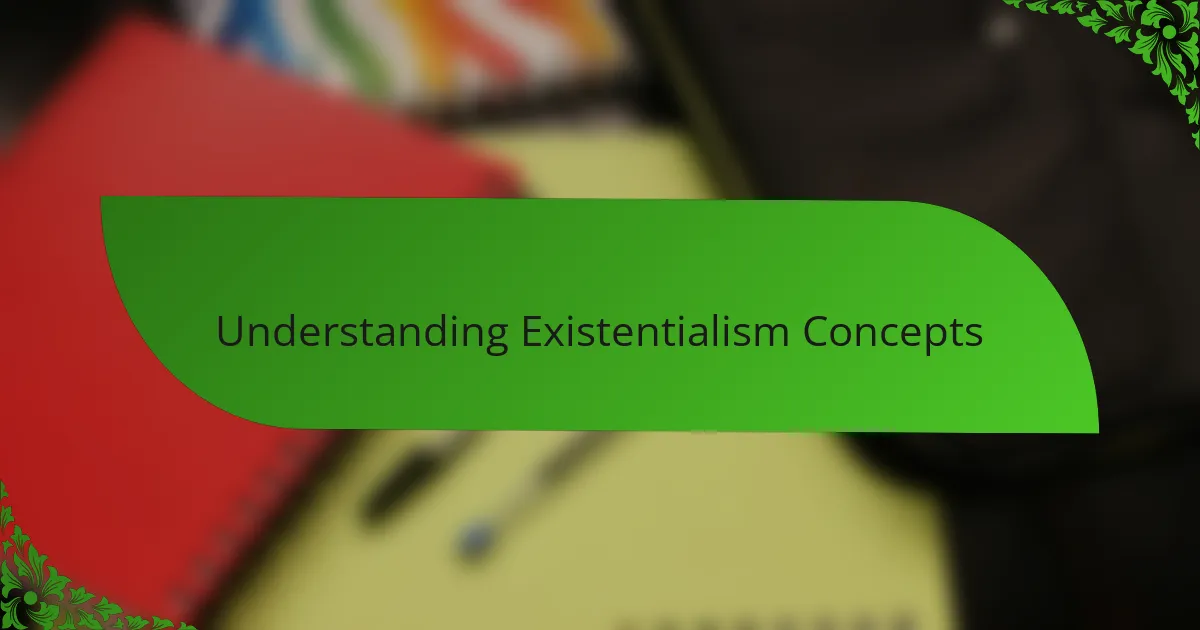
Understanding Existentialism Concepts
Grasping Sartre’s existentialism felt like awakening to the weight of absolute freedom. I kept asking myself, “If there’s no predefined essence, how do I even begin to define who I am?” That question lingered, pushing me to realize that existence truly precedes essence—our lives are blank slates waiting for us to write meaning through choices.
One concept that struck me deeply was “bad faith,” the idea of self-deception to avoid responsibility. Reflecting on times I denied my freedom by blaming circumstances, I felt a twinge of discomfort—but also clarity. It’s unsettling to recognize how often we flee from the truth of our freedom, yet that awareness opened new doors for personal authenticity.
What does it mean to live authentically? Sartre’s notions challenged me to confront anxiety not as a weakness but as a sign of genuine freedom. I came to see anxiety as a companion, urging me to own my decisions fully rather than hide behind excuses. This shift in perspective transformed my understanding in powerful, personal ways.
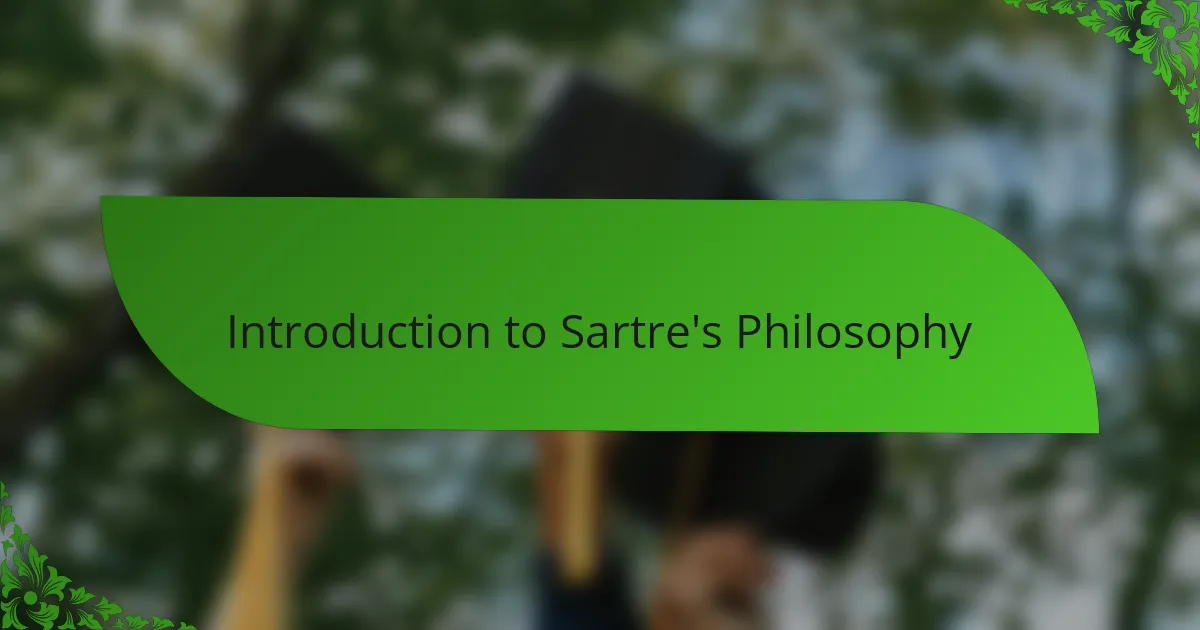
Introduction to Sartre’s Philosophy
Sartre’s philosophy first hit me as both thrilling and terrifying. The idea that we are “condemned to be free” shook my core—freedom isn’t a liberating gift but a burden we must carry without escape. Facing that responsibility felt like standing alone on a vast, empty stage, wondering what role I was meant to play.
He insisted that there is no human nature or predetermined path; instead, we craft ourselves through actions. I found myself wondering, if I am not born with a script, then how do I decide who to be? That open-endedness felt like both an invitation and a challenge I hadn’t expected.
What resonated most was Sartre’s focus on lived experience over abstract theory. His emphasis on concrete choices made philosophy feel personal, as if he was inviting me to examine my daily decisions under a new light. That’s when his ideas stopped being just words and became a mirror reflecting my own struggles with freedom and responsibility.
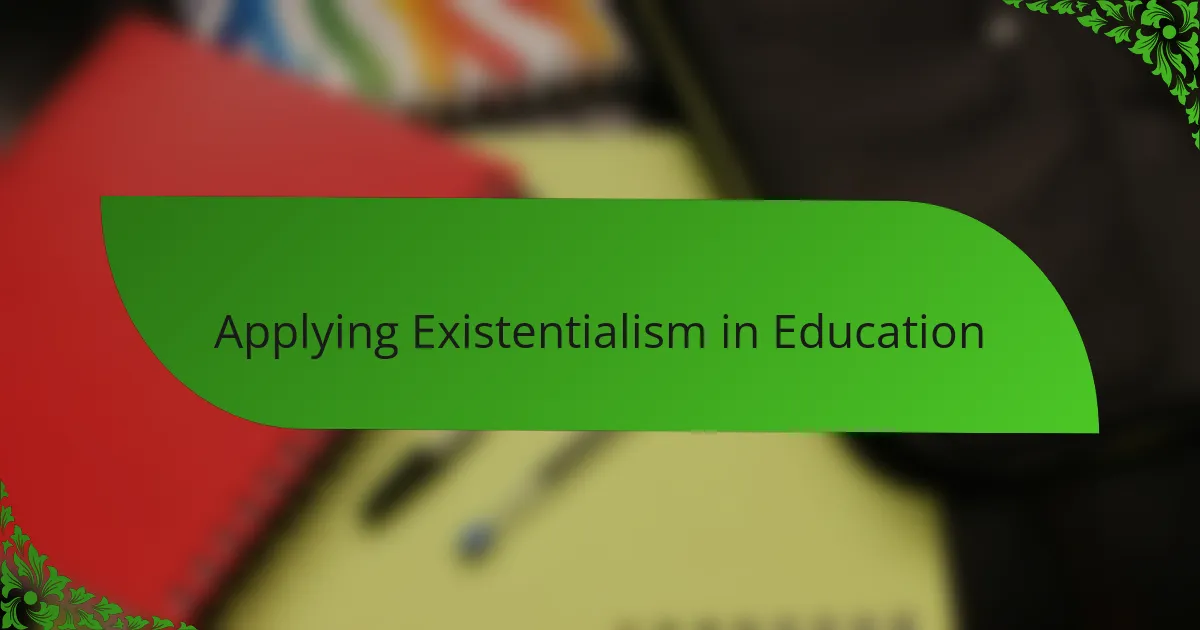
Applying Existentialism in Education
Applying existentialism in education means recognizing that each student is a unique individual responsible for their learning path. I remember moments when I allowed myself to embrace this freedom, choosing projects that resonated with my authentic interests instead of following rigid curricula. That choice transformed learning from a chore into a meaningful exploration.
But how do educators balance guiding students and honoring their freedom? From my experience, creating a classroom environment that encourages questioning and self-reflection helps students confront their own “bad faith” — those moments they avoid owning their choices. It’s empowering to watch learners step into their freedom and shape their identities through education.
This existential approach also requires accepting the anxiety that comes with freedom. When I first applied these ideas, I noticed how uncertainty about “the right answer” sparked discomfort but also curiosity. Instead of fearing ambiguity, I learned to see it as fertile ground for genuine growth, both for myself and my students.
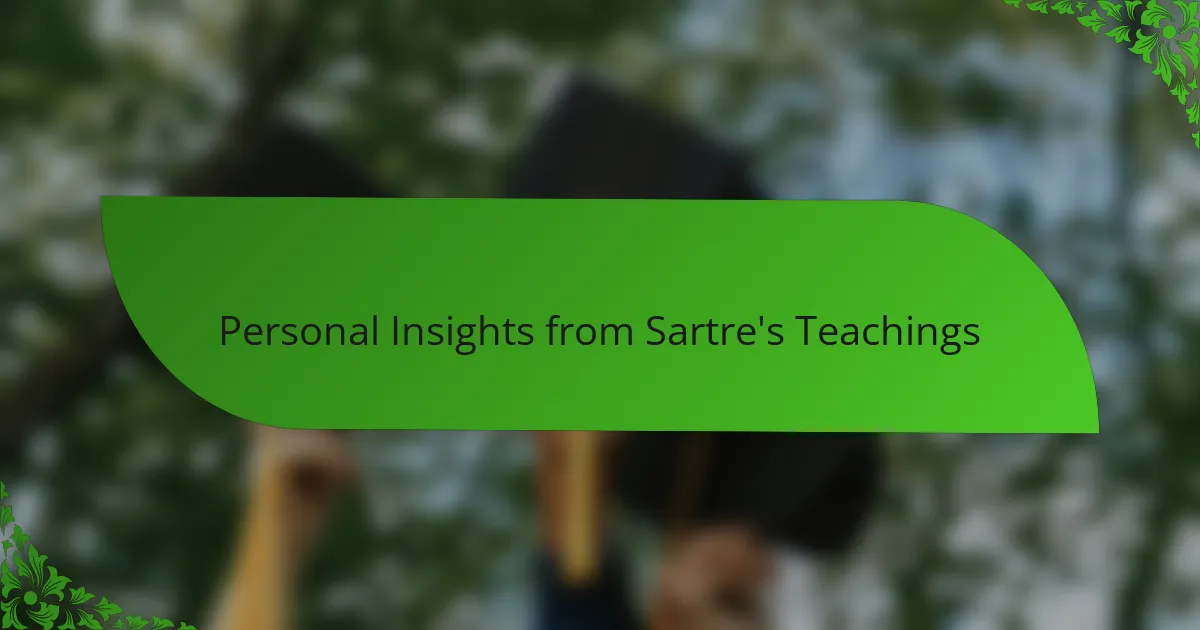
Personal Insights from Sartre’s Teachings
Sartre’s idea that we are constantly creating ourselves through our choices really hit home for me. It made me ask: am I truly acting according to who I want to be, or am I just going along with what feels safe? Wrestling with that question forced me to confront uncomfortable truths about moments I’ve settled for excuses instead of embracing my freedom.
I also found myself drawn to Sartre’s warning against “bad faith” because it exposed how often I live in denial, pretending circumstances control me. Admitting this wasn’t easy—it felt like peeling back a layer of self-deception—but it sparked a desire to become more honest with myself. That awareness became the first step toward genuine personal growth.
Finally, accepting that anxiety is part of living authentically changed the way I face challenges. Instead of running from that uneasy feeling, I try to listen to it as a signal that I’m making meaningful choices. It’s a small but powerful shift that reminds me freedom isn’t just a right—it’s a responsibility that calls for courage every day.
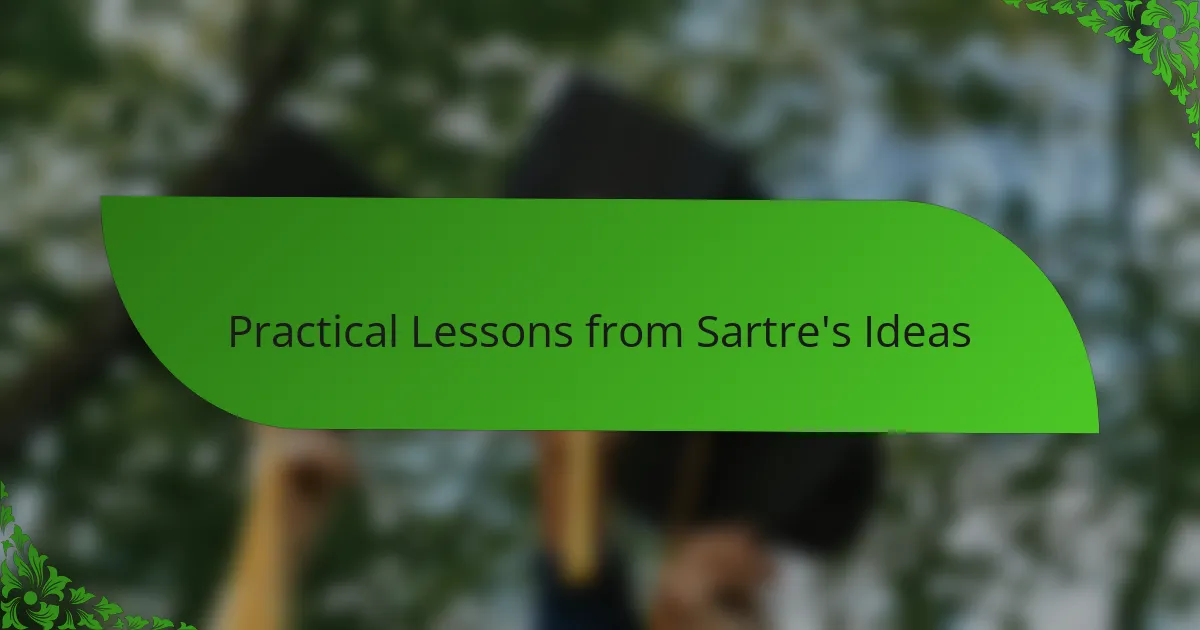
Practical Lessons from Sartre’s Ideas
One practical lesson I took from Sartre’s ideas is the necessity of embracing freedom without hesitation. It’s tempting to avoid tough decisions, but I realized that dodging choice only deepens my sense of stagnation. Have you ever felt paralyzed by endless options? For me, confronting that fear meant recognizing that freedom isn’t just an abstract idea—it’s a daily practice of commitment.
Sartre’s emphasis on “bad faith” taught me to catch myself in moments of self-deception. I remember a time when I blamed external factors for my dissatisfaction, and that excuse felt comfortable. But once I saw it clearly, it was like a veil lifting—I had the power to change my story. This insight made living authentically less theoretical and more immediate, but also more demanding.
Finally, Sartre’s notion that anxiety signals freedom transformed my relationship with unease. Instead of seeing anxiety as an enemy, I started to welcome it as a sign I’m on the right path, making real choices. This mindset shift hasn’t erased discomfort, but it gave me a companion in those moments of doubt—a reminder that feeling unsettled is just part of owning my existence.
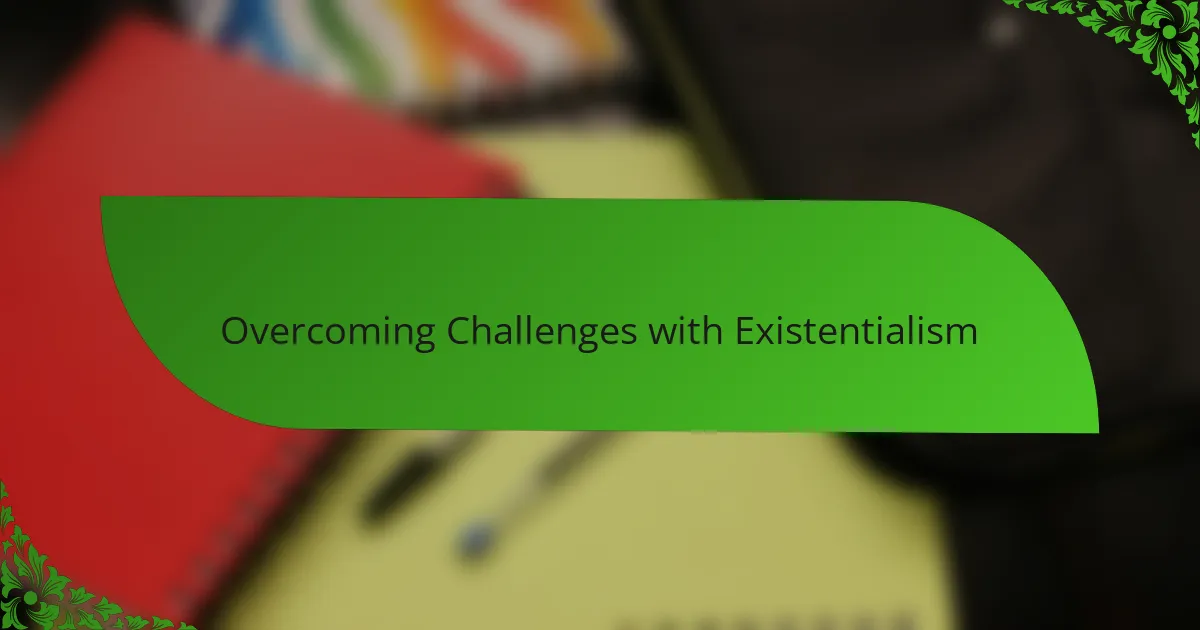
Overcoming Challenges with Existentialism
Overcoming challenges with existentialism felt like wrestling with a constant internal dialogue. I often asked myself, “How do I stop hiding behind excuses and truly own my freedom?” It wasn’t easy to face that nagging sense of responsibility, but leaning into discomfort became a way to break free from those mental chains.
There were moments when the weight of choice felt overwhelming—too many possibilities, too much uncertainty. Yet, I realized that running from this anxiety only trapped me in “bad faith.” Instead, I learned that embracing those uneasy feelings meant I was moving closer to authentic living, even if it was scary.
What helped me most was treating freedom like a muscle that needs exercise. Each time I confronted a difficult decision rather than avoiding it, I grew stronger at facing my existence head-on. This ongoing practice reminds me that existential challenges aren’t obstacles to escape, but invitations to deepen my commitment to living honestly.
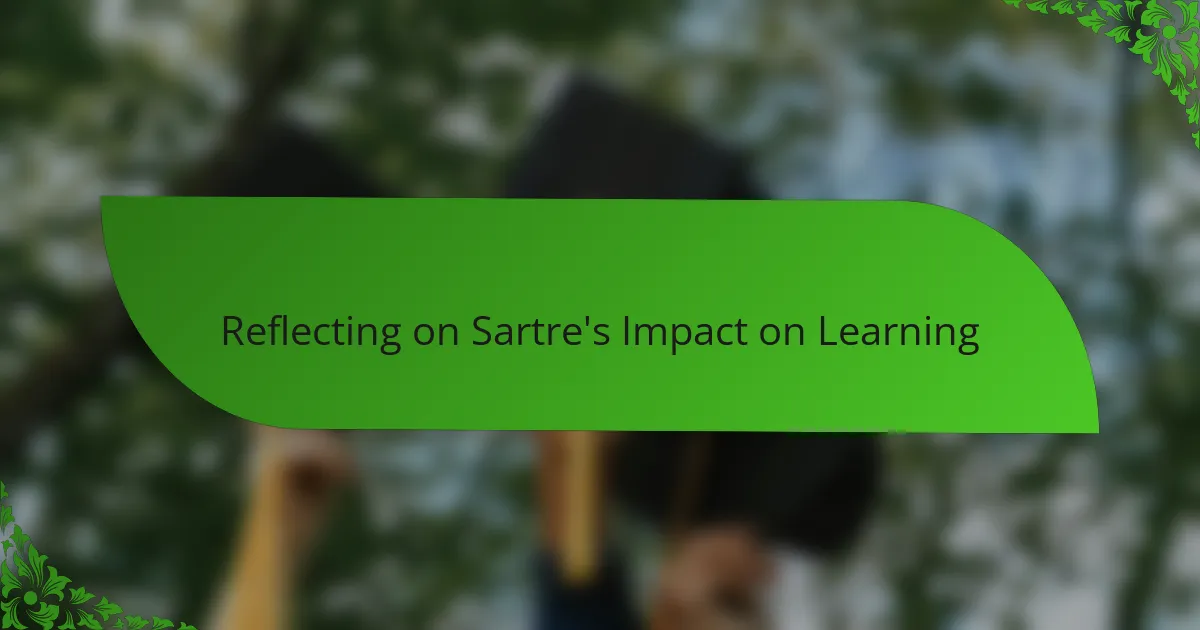
Reflecting on Sartre’s Impact on Learning
Reflecting on Sartre’s impact on my learning, I realize how his insistence on absolute freedom pushed me to take full ownership of my educational journey. Instead of passively absorbing knowledge, I found myself actively choosing what to engage with, which made learning feel deeply personal. Have you ever noticed how this shift changes the entire dynamic of being a student?
There’s also this emotional complexity Sartre introduced that surprised me. Embracing freedom brought anxiety, yes, but it also sparked motivation—a paradox that I hadn’t expected. That tension became a driving force rather than a roadblock, encouraging me to lean into uncertainty instead of running from it.
What stayed with me most is the challenge to avoid “bad faith” in learning environments. It’s tempting to blame external factors or go through the motions, but Sartre’s teachings urged me to confront these moments honestly. By doing so, education transformed from a requirement into a meaningful project of self-creation.